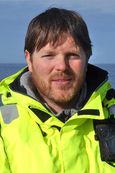Project
Agent-based modelling of angler behaviour

Agent-based modelling of angler behaviour
The project contributes to a better understanding of the behaviour of recreational anglers and their responses to management decisions as precondition for sustainable recreational fisheries management.
Background and Objective
Recreational fishing is of great economic and social importance, but can have significant impacts on selected marine fish stocks. Therefore, catch and harvest of anglers cannot be ignored by fisheries management. The introduction of regulations limiting recreational harvest of cod in the Baltic Sea (bag limit) has led to changes in the behaviour of anglers (significant reduction in fishing effort) and thus to a deviation between realized and estimated catches. The form and extent of this change in fishing behaviour is difficult to quantify and varies greatly between different types of anglers.
The study aims to improve the understanding of angler behaviour. Based on the project "Recreational fishing in Germany" (survey on the motivations and attitudes of anglers) an agent-based model will be developed, which includes individual decision-making processes and allows to model the behaviour of individual anglers. The model will allow us to test management decisions in advance, assessing potential angler responses to different fisheries regulations. This enables us to take the interests of anglers into account in future fisheries management and to promote sustainable recreational fishing.
Approach
As a first step, the changes in the behaviour of German Baltic Sea anglers after the introduction of the bag limit will be examined. Subsequently, based on the project “Recreational fishing in Germany”, important characteristics of individual anglers are recorded and an overview of the heterogeneity of the German cod angler community is created. On this basis an agent-based continuous time model is developed for which the modelling language ML3 will be used. The model will be validated in two scenarios with the help of SESSL (Simulation Experiment Specification via a Scala Layer).
Thünen-Contact

Involved Thünen-Partners
Funding Body
-
European Union (EU)
(international, öffentlich)
Duration
7.2019 - 7.2023
More Information
Project status:
finished
Publications
- 0
Weltersbach MS, Lewin W-C, Haase K, Eckardt J, Strehlow HV (2024) 20 Years of Work on Marine Recreational Fisheries at the Thünen Institute of Baltic Sea Fisheries. Braunschweig: Johann Heinrich von Thünen-Institut, 87 p, Thünen Working Paper 234, DOI:10.3220/WP1710484687000
- 1
Haase K, Reinhardt O, Lewin W-C, Weltersbach MS, Strehlow HV, Uhrmacher AM (2023) Agent-based simulation models in fisheries science. Rev Fish Sci Aquacult 31(3):372-395, DOI:10.1080/23308249.2023.2201635
- 2
Haase K, Weltersbach MS, Lewin W-C, Zimmermann C, Strehlow HV (2022) Potential effects of management options on marine recreational fisheries - the example of the western Baltic cod fishery. ICES J Mar Sci 79(3):661-676, DOI:10.1093/icesjms/fsac012
- 3
Haase K, Strehlow HV, Lewin W-C, Reinhardt O, Uhrmacher AM (2022) Site choice in recreational fisheries - towards an agent-based approach. In: Feng B, Pedrielli G, Peng Y, Shashaani S, Song E, Corlu CG, Lee LH, Chew EP, Roeder T, Lendermann P (eds) Proceedings of the 2022 Winter Simulation Conference (WSC), 11-14 Dec. 2022, Singapore. Piscataway, NJ, USA: IEEE, pp 819-830, DOI:10.1109/WSC57314.2022.10015240

![[Translate to English:] [Translate to English:]](/media/_processed_/d/7/csm_Startseite-OF_03_c0dfd6e750.png)
![[Translate to English:] [Translate to English:]](/media/_processed_/a/3/csm_20181116-151457-Stella-Jerome-Fischfalle-Warnem%C3%BCnde-Dorsche-im-Netzk%C3%A4fig-5691_heller_3050c72fa2.png)




